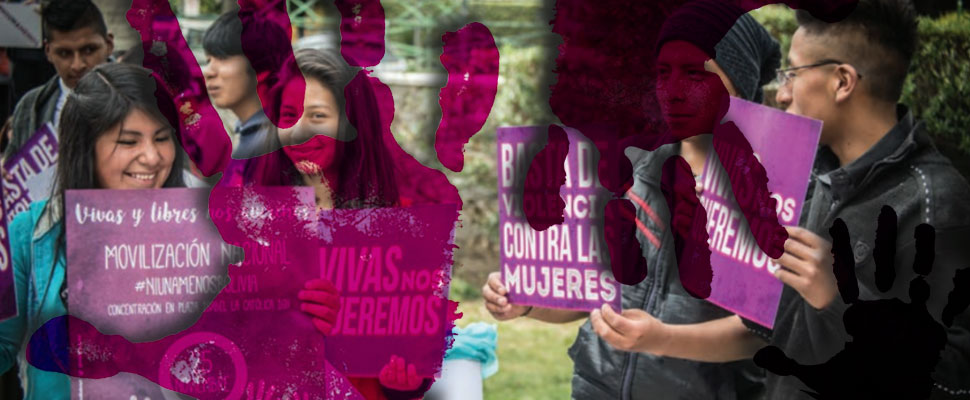Latin America: sexist violence is still common among young people
Listen this article
Destroying prejudices and stigmas about women is one of feminism's goals to reduce gender violence in the region

Jealousy and possessive love, a product of beliefs that are linked to romantic love, could be the main causes of violence against women in Latin America. A recent study by Oxfam describes it that way.
Leer en español: América Latina: la violencia machista todavía es común en los jóvenes
Other imaginaries that affect women are evident in the report, in which it is surprising the prejudiced reactions of Latin American men and women alike.
Recollected data
Latin America and the Caribbean is the most unequal region in the world, according to the UN. Macho violence makes levels of inequality more prominent, especially in relation to the gap between the equality of men and women in the region, says Oxfam.
Oxfam's study is called "Breaking the mould: changing belief systems and gender norms to eliminate violence against women in Latin America and the Caribbean". In this study, it has been shown that in Latin America there are prejudiced thoughts about the autonomy of women, which unleashes all kinds of violence.
"Among the normalized behaviors is the conception of prejudice," Belén Sobrino points out to DW, referring to several of the ideas that the surveyed population approves to determine the stigmatizing figures and parameters that are a trend in Latin America.
The sample, a population of young people aged 15 and 19, resulted in:
- Of these, 62% of women and 72% of men believe that 'a decent woman should not dress provocatively or walk alone at night'.
- For 51% of women and 62% of men, it is normal that if a man is drunk he can hit a woman.
- 87% of women and men believe that male sexual desire is greater than female.
- 'When women get angry and say no, they really mean yes.' To this statement, 45% of women and 65% of men say that it is true.
- 75% of women and men think it is normal for a man to say compliments to a woman on the street.
Other data collected indicate that trans and lesbian women suffer more severe violence that delegitimizes their identities.
Jóvenes de Latinoamérica aún consideran “normal” la violencia machista. Un estudio de @oxfam_es así lo demuestra. Algunos datos en este vídeo: pic.twitter.com/2HvEGTDJug
— JORGE (@JYBecerraa) February 4, 2019
You may be interested in reading: Cultural change: the way to stop femicides
Other annotations
In an interview with DW, Belén Sobrino, co-author of the report and main gender adviser at Oxfam, questions the fact that many young people still think that sexism is a problem that belongs to the states. "They do not see that the change comes from a personal way of being," he says.
The perceptions collected for research are determinant to ensure that the cause of violence is the lack of autonomy, in every area, for the free development of women.
"Controlling the woman's contact on the internet, checking her phone, her messages, is not perceived as violence," he says, adding that the symbolic violence caused by possessiveness and romantic love is one of the most serious evils.
"63% of men and 43% of women between 15 and 19 years of age characterize jealousy as a demonstration of love", the study shows, which is alarming, since jealousy is the main trigger for femicide, according to the Latin American Faculty of Social Sciences.
Latin America has made progress in public policies that favor the well-being of women: 16 of them have taken the lead in defending women's human rights and 15 of them have typified femicides from a differential perspective, the study concludes. However, there are flaws in the execution and resources of these politics.
The Times They Are A-Changing?
Oxfam and other European organizations that sponsor the study see the phenomenon of sexism as an aspect of life that needs to be eradicated and they are encouraged by the transformation that must already take place.
"We know that this can and is already changing; we must promote and support young people in this transformation so that they live free from gender violence," Damaris Ruiz, Oxfam's Women's Rights Coordinator in Latin America and the Caribbean, said in the report.
For this reason, the political incidence of feminist and popular organizations, the young and independent activism and the diffusion of information through the networks promoted by alternative journalism becomes relevant to change sexist imaginaries.
"We work with community leaders, with journalists, with networks of feminists. To change these imaginaries we must start by making young people aware that #Metoo," explains DW Belén Sobrino.
On the other hand, the general vision of the laws implemented by the different governments is a small door to begin to glimpse a change. However, for now with little guarantee results. The evidence of this is the 2795 femicides that occurred in Latin America during 2017, according to ECLAC.
América Latina alberga a 14 de los 25 países con las tasas más altas de feminicidio en el mundo. El 98% de esos casos no son enjuiciados.
Mira las cifras del Observatorio de Igualdad de Género de la @cepal_onu: https://t.co/rAre8DYAv8 pic.twitter.com/k5alYIXp65
— Naciones Unidas (@ONU_es) January 22, 2019
Alicia Bárcena, Executive Secretary of ECLAC, during the presentation of the annual report on femicide cases, called on countries to prioritize policies and regulations to prevent, eradicate and punish any type of violence against women in the region.
"Femicide is the most extreme expression of violence against women. Neither the typification of the crime nor its statistical visibility have been enough to eradicate this scourge that alarms and horrifies us every day," she added.
LatinAmerican Post | Jorge Becerra
Translated from "América Latina: la violencia machista todavía es común en los jóvenes"





